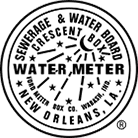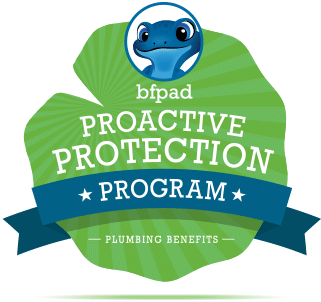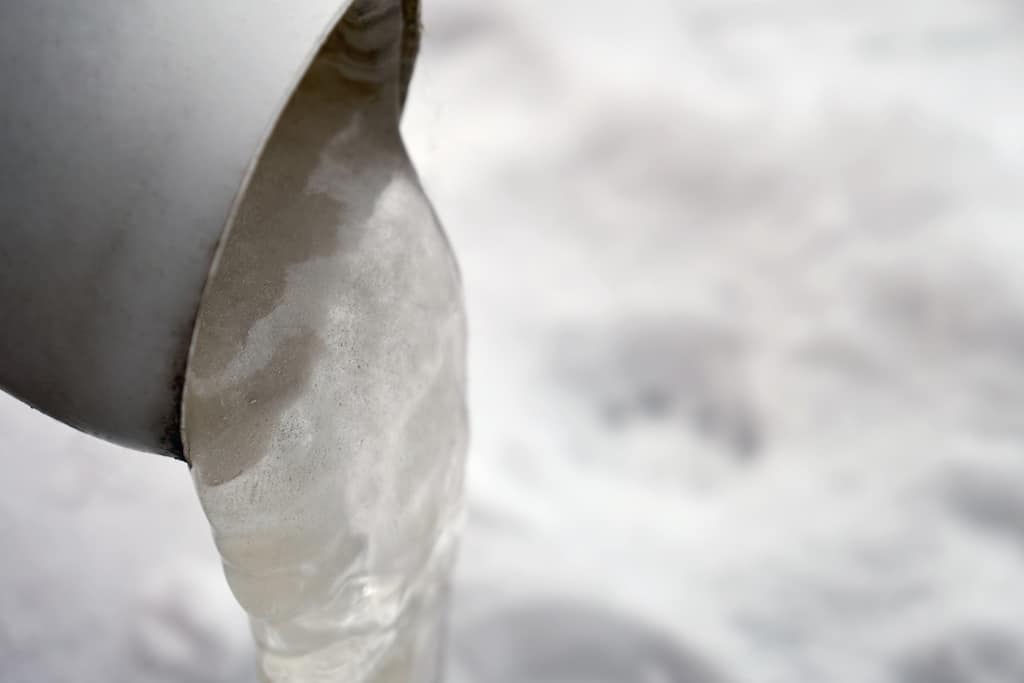
Plumber Frozen Pipes: Your Go-to Guide For Your Home
Have you ever woken up to the unpleasant surprise of no water flowing from your taps on a chilly morning?
You’re not alone.
Many homeowners face the daunting issue of frozen pipes, especially during the colder months. This common problem can lead to significant inconvenience and, if not addressed promptly, serious damage to your home’s plumbing system.
In this article, we’ll delve deep into the world of plumbing, specifically focusing on the challenge of plumber frozen pipes.
We’ll explore what causes pipes to freeze, how to prevent it, and most importantly, how to fix it. Whether you’re a seasoned homeowner or new to the challenges of property maintenance, this guide will provide you with practical, easy-to-understand advice and solutions.
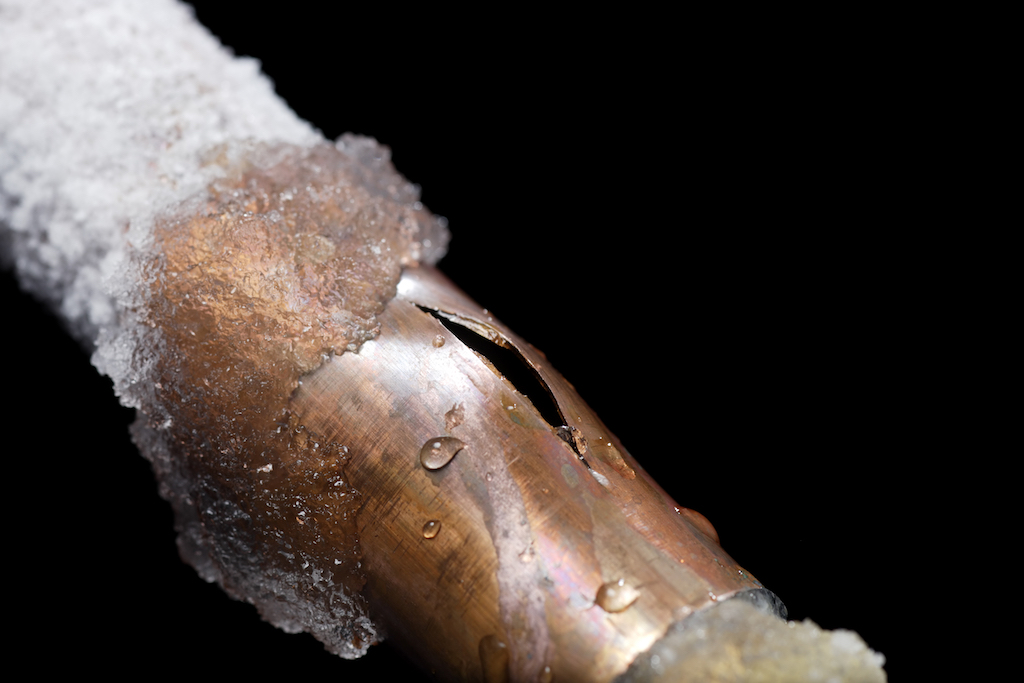
Photo By Paul Tessier at ShutterStock
What are Plumber Frozen Pipes?
Plumber frozen pipes are a significant concern, especially in regions where temperatures plummet during winter.
This situation arises when the water inside your plumbing system succumbs to the freezing cold, transforming into ice. This ice formation within the pipes can cause a complete or partial blockage, disrupting the normal flow of water.
As water expands when it freezes, this leads to an increase in pressure inside the pipes. This pressure buildup is not something to take lightly, as it can cause the pipes, whether they’re made of metal or plastic, to crack or even burst, leading to potential flooding and water damage in your home.
The issue of plumber frozen pipes is not just a minor inconvenience; it can escalate into a serious problem if not addressed promptly. It’s particularly prevalent in areas that experience severe winter conditions, but can also occur in homes with poor insulation or where pipes are exposed to drafts.
The consequences of frozen pipes extend beyond the lack of water access; they can lead to extensive and expensive repairs. This is why understanding what a plumber can do for frozen pipes and how they can fix frozen pipes is crucial for homeowners.
Taking proactive steps to insulate and protect your plumbing system, and knowing when to call a professional plumber for frozen pipes, can save you from the hassle and expense of dealing with burst pipes and water damage.
Also read: Why You Should Not Put Off Drain Cleaning
Why Pipes Freeze
Understanding why pipes freeze is crucial in preventing the common yet troublesome issue of plumber frozen pipes.
By knowing the typical conditions that lead to this problem, you can take proactive steps to safeguard your home.
Exposure to Severe Cold
Pipes are most vulnerable in areas that are directly exposed to severe cold.
This includes outdoor locations such as hose bibs, swimming pool supply lines, and water sprinkler lines. When the temperature drops significantly, the water in these pipes can quickly freeze, leading to the risk of plumber frozen pipes.
Indoor Pipes in Unheated Areas
It’s not just the outdoor pipes that are at risk. Indoor pipes located in areas of your home that are not regularly heated can also freeze.
Basements, attics, and garages are common places where pipes are susceptible to freezing due to the lack of consistent heat. Even pipes hidden in kitchen cabinets or running through exterior walls can freeze if they are not adequately insulated or if the temperatures drop drastically.
Lack of Insulation
Insufficient insulation is a major contributing factor to plumber frozen pipes.
Pipes that are not properly insulated, especially those in unheated areas or against exterior walls, are more likely to freeze. This is where the role of a plumber for frozen pipes becomes crucial.
They can assess the insulation needs of your plumbing system and recommend appropriate measures to prevent freezing.
Preventive Measures
To prevent plumber frozen pipes, it’s important to take preventive measures, especially before the onset of winter.
This includes insulating pipes, sealing any leaks that allow cold air into your home, and keeping indoor areas sufficiently heated. Simple actions like keeping cabinet doors open to allow warm air to circulate around pipes can make a significant difference.
By understanding these key factors that contribute to the freezing of pipes, you can better prepare and protect your home from the inconvenience and potential damage caused by plumber frozen pipes.
Remember, prevention is always better than cure, and in this case, it can save you from the need for costly repairs and interventions by a plumber for frozen pipes.
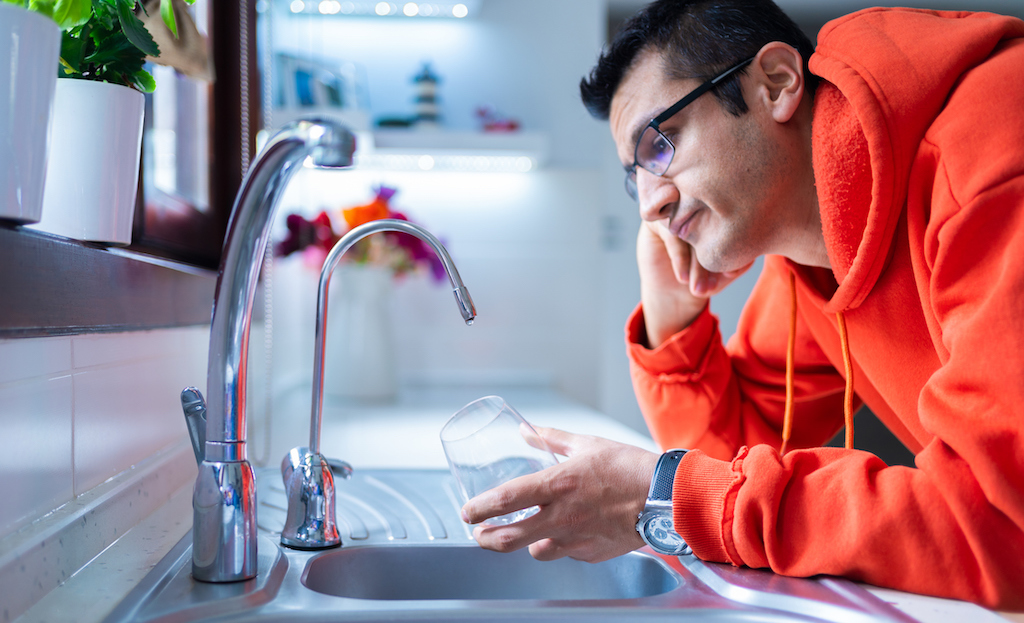
Photo By aquaArts studio at iStock
Signs of Frozen Pipes
Identifying the early signs of plumber frozen pipes is crucial in preventing significant damage to your plumbing system.
Being aware of these indicators can help you take timely action, potentially saving you from the inconvenience and cost of extensive repairs.
Reduced or No Water Flow
One of the most immediate and noticeable signs of plumber frozen pipes is a significant reduction in water flow, or in some cases, a complete lack of water when you turn on a faucet.
This happens because the ice blockage within the pipe restricts the flow of water. If you notice that the water pressure is unusually low or that no water is coming out of your taps, it’s a strong indication that you might be dealing with frozen pipes.
Visible Frost on Pipes
Another clear sign of plumber frozen pipes is the presence of frost on the exterior of the pipes. This is often visible in areas where pipes are exposed, such as under sinks or in basements.
If you see frost accumulating on any pipe, it’s a direct indication that the water inside has started to freeze, and immediate action is required to thaw the pipes safely.
Unusual Sounds When Tap is Turned On
Unusual sounds coming from your pipes when you turn on the tap can also be a sign of freezing. These sounds could be a result of the ice creating a blockage, which disrupts the normal flow of water and causes strange noises.
If you hear clanking, gurgling, or whistling sounds, it’s advisable to investigate further as these could be symptoms of plumber frozen pipes.
Can a Plumber Fix Frozen Pipes?
Upon noticing these signs, the question arises: can a plumber fix frozen pipes? The answer is yes. Professional plumbers have the tools and expertise to safely thaw frozen pipes and repair any damage that may have occurred.
They can also provide valuable advice on preventing future occurrences of frozen pipes.
Recognizing these signs early and understanding the capabilities of a plumber for frozen pipes are essential steps in managing and resolving this common winter problem.
By staying alert to these symptoms, you can act swiftly to mitigate the risks associated with frozen pipes in your home.
Preventive Measures for Plumber Frozen Pipes
Taking proactive steps is key in preventing the inconvenience and potential damage caused by plumber frozen pipes.
By implementing these preventive measures, you can significantly reduce the risk of your pipes freezing during cold spells.
Insulating Pipes
One of the most effective ways to prevent plumber frozen pipes is by insulating your pipes.
This is particularly important for pipes that are exposed to extreme cold, such as those in unheated areas like basements, attics, and garages, as well as outdoor pipes. Pipe insulation acts as a barrier, reducing the likelihood of the water inside the pipes from freezing.
There are various types of insulation available, such as foam rubber or fiberglass sleeves, which can be easily fitted around the pipes.
Sealing Leaks to Prevent Cold Air Infiltration
Another crucial step in preventing plumber frozen pipes is to seal any leaks that allow cold air to enter your home. These leaks can often be found around windows, doors, and where pipes enter and exit your home.
By using caulk or weather stripping to seal these leaks, you can keep the cold air out and maintain a warmer temperature around your pipes. This is especially important in areas where pipes are located near exterior walls.
Maintaining a Consistent Temperature
Keeping your thermostat set to the same temperature day and night is another effective strategy to prevent plumber frozen pipes.
A consistent temperature in your home helps to ensure that the pipes, especially those hidden in walls and cabinets, stay warm enough to prevent freezing. This might result in a slightly higher heating bill, but it’s a small price to pay compared to the cost of repairing burst pipes.
Additional Tips
Let Faucets Drip
Allowing a slight trickle of water to flow through the pipes can also prevent freezing. The movement of water makes it more difficult for ice to form.
Open Cabinet Doors
In kitchen and bathroom cabinets where pipes are present, keeping the doors open can help warm air circulate around the pipes, reducing the risk of freezing.
By following these preventive measures, you can greatly reduce the likelihood of encountering plumber frozen pipes. Regular maintenance and awareness of the risks can help ensure that your plumbing system remains functional and efficient, even during the coldest months.
Also read: 4 Signs You Need A Drain Cleaning Service
Immediate Actions for Plumber Frozen Pipes
When you suspect that a pipe has frozen in your home, taking immediate and appropriate action is crucial to mitigate potential damage.
Here are steps to follow:
Shut Off the Main Water Supply
The first and most critical step when you encounter frozen pipes is to shut off the main water supply.
This is a precautionary measure to prevent flooding in case the frozen pipe bursts. Knowing in advance where your main water shut-off valve is located can save precious time and prevent extensive water damage to your home.
Gently Warming the Frozen Pipe
Once the water supply is turned off, the next step is to gently warm the frozen pipe. This can be done using a hair dryer or by wrapping the pipe with towels soaked in hot water.
It’s important to heat the pipe gradually to avoid any sudden temperature change, which could cause the pipe to crack or burst. Start warming the pipe at the faucet end and slowly move towards the coldest section. This method allows the ice to melt and water to flow freely again.
Avoiding Open Flames
It’s crucial to avoid using any open flame, such as a propane torch, to thaw the pipe. This can be extremely dangerous and may damage the pipe or even cause a fire. Stick to safer methods like a hair dryer or hot towels.
Monitoring for Leaks
As you thaw the pipe, keep an eye out for any leaks. If the pipe has cracked or burst, it’s important to identify this early so that repairs can be made as soon as possible. In such cases, calling a plumber for frozen pipes is advisable.
Seeking Professional Help
If you’re unable to thaw the pipe or if you’re unsure about how to safely proceed, it’s best to call a professional plumber.
They have the expertise and equipment to safely and effectively deal with plumber frozen pipes. They can also assess your plumbing system and provide advice on how to prevent future freezing.
By taking these immediate actions, you can effectively manage the situation of plumber frozen pipes and prevent further damage to your home. Remember, when in doubt, seeking the help of a professional plumber for frozen pipes is always a wise decision.
Professional Intervention for Plumber Frozen Pipes
When faced with severe cases of plumber frozen pipes, the expertise and equipment of a professional plumber become indispensable.
Here’s a detailed look at how professional intervention can be crucial in handling and resolving issues related to plumber frozen pipes:
Expertise in Handling Frozen Pipes
Professional plumbers bring a wealth of experience and knowledge to the table when dealing with plumber frozen pipes.
They are well-versed in identifying the exact location of the freeze and the most effective methods for safely thawing the pipes. This expertise is particularly valuable in complex situations where the frozen section is not easily accessible or when there are multiple frozen areas.
Advanced Equipment for Thawing Pipes
Plumbers have access to specialized equipment designed specifically for thawing frozen pipes. This equipment is far more effective and safer than DIY methods like hair dryers or hot towels.
For instance, plumbers may use electric pipe thawing machines, which can quickly and safely thaw pipes without the risk of damage.
Repairing Damaged Pipes
In some cases, frozen pipes may have already sustained damage, such as cracks or bursts.
A professional plumber can not only thaw the pipe but also carry out the necessary repairs. Whether it’s a minor crack that needs sealing or a section of pipe that needs replacing, a plumber has the skills and tools to restore your plumbing system to its optimal condition.
Preventive Advice and Long-Term Solutions
Beyond immediate repairs, professional plumbers can provide valuable advice on how to prevent pipes from freezing in the future.
This might include recommendations for insulating pipes, rerouting certain sections of your plumbing, or installing pipe heating cables. Such preventive measures can save homeowners from recurring issues and expenses.
Emergency Plumbing Services
Many plumbing companies offer emergency services for situations like plumber frozen pipes. This means you can get professional help quickly, minimizing the risk of extensive water damage to your home.
For severe cases of plumber frozen pipes, professional intervention is not just a recommendation; it’s a necessity.
The expertise, equipment, and repair capabilities of a professional plumber are essential for safely resolving these issues and preventing future occurrences.
If you’re facing a situation where your pipes have frozen, don’t hesitate to call a plumber for frozen pipes for prompt and effective service.
DIYs vs Professional Approach in Handling Plumber Frozen Pipes
When it comes to dealing with plumber frozen pipes, homeowners often face the dilemma of choosing between DIY methods and seeking professional help.
Understanding the pros and cons of each approach is crucial for making an informed decision.
DIY Approaches to Thawing Frozen Pipes
DIY methods can be effective for minor cases of plumber frozen pipes. Homeowners might use tools like hair dryers, heating pads, or warm towels to gently thaw the frozen section of the pipe. This approach is cost-effective and can be immediately implemented.
However, it requires caution to avoid damaging the pipes or causing a fire hazard. DIY methods are best suited for pipes that are easily accessible and not severely frozen.
Limitations of DIY Methods
While DIY approaches can be useful, they have limitations. In cases where the frozen pipe is not easily accessible or if the freezing is extensive, DIY methods may not be sufficient. There’s also the risk of uneven heating or applying too much heat, which can damage the pipes.
Additionally, DIY methods do not provide a long-term solution to prevent future occurrences of frozen pipes.
Professional Plumbers for Frozen Pipes
Seeking the help of a professional plumber for frozen pipes is often the safer and more effective option, especially in severe cases.
Professional plumbers have the expertise, experience, and equipment necessary to safely thaw and repair frozen pipes. They can handle complex situations, such as pipes located in walls or underground, which are beyond the scope of most DIY methods.
Advantages of Professional Intervention
The main advantage of professional intervention is the assurance of a safe and thorough job. Plumbers can not only fix the current issue but also inspect your plumbing system to identify and rectify any underlying problems.
This can prevent future instances of plumber frozen pipes. Additionally, professional plumbers can offer expert advice on insulation and other preventive measures.
While DIY methods for dealing with plumber frozen pipes can be effective for minor issues, they have their limitations.
In cases of severe freezing or when the frozen pipes are not easily accessible, the expertise of a professional plumber becomes invaluable. They provide not only immediate solutions but also guidance for long-term prevention, ensuring the safety and integrity of your home’s plumbing system.
Understanding the Risks of Frozen Pipes
Dealing with frozen pipes involves more than just addressing the immediate inconvenience.
It’s crucial to understand the risks associated with this issue to ensure the safety and longevity of your plumbing system.
The Impact of Frozen Pipes on Home Plumbing Systems
When water in your plumbing system freezes, it expands, putting immense pressure on the pipes. This pressure can cause cracks or even burst pipes, leading to significant water damage in your home.
The impact is not just limited to the inconvenience of not having running water; it can also result in costly repairs and potential mold growth due to water leakage.
Understanding the structure of your home’s plumbing system is key. Pipes that run along exterior walls, in unheated basements, or in attics are particularly vulnerable to freezing.
The type of material used in your pipes, whether it’s copper, PVC, or PEX, also affects their susceptibility to damage from freezing. Regular maintenance and inspections by a professional plumber can help identify potential weak points in your system before they become problematic.
Health and Safety Concerns with Frozen Pipes
Plumber frozen pipes can also pose health and safety concerns. If a pipe bursts and causes flooding, it can lead to the growth of mold and mildew, which are harmful to health, especially for those with respiratory issues.
Additionally, the process of thawing pipes, if not done correctly, can lead to accidents, including burns or even fires.
It’s important to be aware of the signs of mold growth, such as musty odors or visible mold patches, following a pipe burst.
Taking immediate action to dry out and clean the affected area is crucial. In cases of significant water damage, professional remediation services may be necessary to ensure a safe living environment.
Financial Implications of Frozen Pipe Damage
The financial implications of plumber frozen pipes are another critical aspect to consider.
The cost of repairing or replacing burst pipes can be substantial, not to mention the potential damage to walls, flooring, and personal belongings. Homeowners may also face increased insurance premiums following a claim for water damage.
To mitigate these financial risks, it’s advisable to review your home insurance policy to understand what is covered in the event of damage caused by frozen pipes. Some policies may not cover such incidents if it’s determined that the homeowner did not take reasonable steps to prevent the pipes from freezing.
Therefore, investing in preventive measures, such as proper insulation and regular plumbing maintenance, is not only practical but also financially prudent.
Long-Term Strategies for Managing Plumber Frozen Pipes
Addressing plumber frozen pipes is not just about immediate fixes; it involves implementing long-term strategies to ensure the problem doesn’t recur.
This section will explore various approaches.
Innovative Technologies in Plumbing to Prevent Frozen Pipes
The world of plumbing is continuously evolving, with new technologies emerging to help prevent issues like plumber frozen pipes.
One such innovation is smart home technology, which includes Wi-Fi-enabled thermostats that allow homeowners to control their home’s temperature remotely. This technology is particularly useful in maintaining a consistent temperature in the home, which is crucial in preventing pipes from freezing.
Another technological advancement is the use of self-regulating heating cables.
These cables can be wrapped around pipes and are designed to adjust their heat output based on the surrounding temperature. This means that they increase heat as the temperature drops, providing extra protection for pipes during cold snaps.
Additionally, there are now freeze alarms that can notify homeowners if the temperature in certain areas of their home drops to a level where pipes are at risk of freezing. These alarms can be crucial in preventing plumber frozen pipes, especially for those who travel during the winter months.
Landscape and Exterior Home Adjustments to Protect Pipes
The exterior of your home and the landscape can significantly impact the risk of plumber frozen pipes.
One strategy is to ensure proper drainage away from the home’s foundation. Water pooling near the foundation can freeze and increase the cold exposure of nearby pipes.
Landscaping choices can also play a role. Planting shrubs or creating barriers can help shield pipes from cold winds.
Additionally, homeowners should consider the location of outdoor faucets and pipes when planning their garden or outdoor space. Ensuring these are situated in areas less exposed to severe cold can reduce the risk of freezing.
For homes with sprinkler systems, proper winterization is crucial. This includes draining the system and shutting off the water supply to outdoor pipes. Failure to do this can result in frozen and burst pipes, leading to expensive repairs.
Educational Outreach and Awareness Programs
Educational outreach and awareness are vital in preventing frozen pipes.
Many homeowners may not be aware of the risks or the steps they can take to protect their homes. Plumbing companies and local governments can collaborate to provide resources and educational programs on winterizing homes and understanding the plumbing system.
These programs can include workshops, informational pamphlets, and online resources that cover topics like proper insulation techniques, how to locate and shut off the main water valve, and signs of frozen pipes.
By increasing awareness and knowledge among homeowners, the incidence of frozen pipes can be significantly reduced.
Comprehensive Guide to Seasonal Maintenance for Plumber Frozen Pipes
Ensuring your plumbing system is prepared for each season is crucial in preventing plumber frozen pipes. This section will delve into seasonal maintenance tips.
Spring and Summer: Preparing for the Cold Months Ahead
During spring and summer, it’s easy to overlook the potential issue of plumber frozen pipes. However, this is the perfect time to prepare and prevent future problems.
Start by inspecting your plumbing system for any signs of damage or wear that could make pipes more susceptible to freezing. This includes checking for leaks, cracks, or weak joints.
It’s also a good time to consider upgrading or replacing any insulation that has deteriorated over the past year. Insulating your pipes is a key step in preventing them from freezing during the colder months.
Additionally, evaluate the locations of your pipes, especially those in unheated areas like basements or garages, and consider rerouting them if they are at high risk of freezing.
Another important task is to ensure proper ventilation in areas where pipes are located.
During the warmer months, some homeowners close vents in basements or crawl spaces to save on air conditioning costs, but this can lead to increased humidity and reduced air circulation around pipes, making them more prone to freezing when the temperature drops.
Fall: The Critical Time for Winterization
As fall approaches, it’s crucial to begin the process of winterizing your home to prevent frozen pipes. This involves a thorough inspection of your home’s exterior to identify any cracks or gaps where cold air could enter and come into contact with pipes.
Sealing these gaps with caulk or insulation is a simple yet effective way to protect your pipes.
Draining and shutting off outdoor faucets and irrigation systems is another essential step. Water left in these systems can freeze, causing the pipes to burst.
It’s also a good time to detach and store any hoses used outdoors to prevent water from freezing inside them and potentially damaging the connected pipes.
Inside your home, consider installing pipe sleeves or using heat tape on exposed pipes, especially those in unheated areas.
These additional layers of protection can be crucial in preventing frozen pipes when temperatures plummet.
Winter: Ongoing Vigilance and Quick Response
During winter, regular monitoring of your plumbing system is key to preventing plumber frozen pipes.
Keep an eye on the weather forecast and take extra precautions during particularly cold spells. This includes keeping your home at a consistent temperature, even at night or when you’re away, to prevent the interior pipes from freezing.
If you plan to be away from home for an extended period, it’s advisable to leave your heating on at a low setting to keep the pipes warm.
You can also shut off the main water supply and drain the system to prevent any water from freezing inside the pipes.
In the event that you do encounter a frozen pipe, act quickly to thaw it using safe methods like a hair dryer or warm towels. However, if you’re unsure or the situation seems severe, don’t hesitate to call a professional plumber for assistance.
This comprehensive guide to seasonal maintenance for frozen pipes covers the essential steps homeowners should take throughout the year to protect their plumbing systems.
By following these tips and remaining vigilant, you can significantly reduce the risk of encountering frozen pipes and the associated inconveniences and costs.
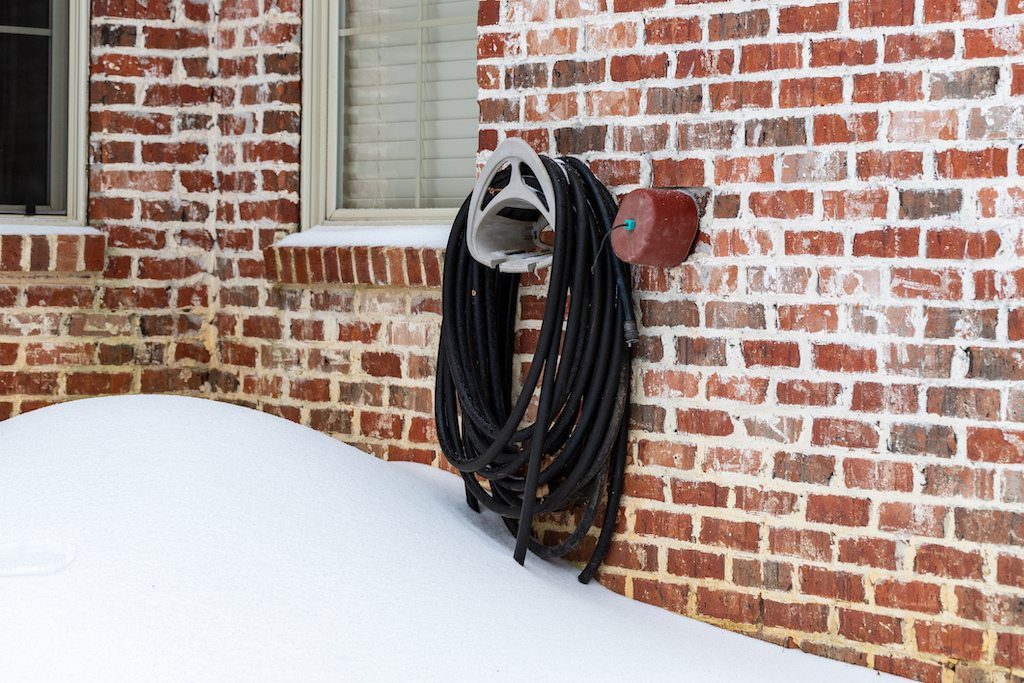
Photo By CRobertson at iStock
Top 5 Tips for Dealing with Plumber Frozen Pipes
Dealing with plumber frozen pipes can be a daunting task, especially in the cold winter months. Here are the top five tips to help you manage and prevent this common issue.
Maintain a Warm Home Environment
Keeping your home consistently warm is one of the most effective ways to prevent frozen pipes.
Ensure that your heating system is in good working order, as a well-heated home keeps the pipes warm and less susceptible to freezing.
In particularly cold areas of your home, such as basements or near exterior walls, consider using space heaters to provide additional warmth. However, always use space heaters with caution and according to safety guidelines to prevent any fire hazards.
Insulate Exposed Pipes
Insulating your pipes is a key step in preventing them from freezing. Use foam pipe insulation or heating tape on pipes that are particularly exposed to cold air.
This is especially important in unheated areas of your home, such as garages, attics, or crawl spaces. Proper insulation can keep the pipes warm and significantly reduce the risk of them freezing.
Let Faucets Drip
Allowing a slight trickle of water to flow through your pipes can prevent them from freezing. The movement of water, even in small amounts, helps prevent ice from forming inside the pipes.
This is a simple yet effective technique, particularly during extreme cold weather or at night when temperatures drop significantly.
Seal Drafts and Leaks
Preventing cold air from entering your home is crucial in the fight against plumber frozen pipes. Check for drafts around windows, doors, and areas where pipes enter your home. Use caulk or insulation to seal these drafts.
Keeping the cold air out not only helps prevent your pipes from freezing but also improves the overall energy efficiency of your home.
Understand Your Plumbing Layout
Knowing the layout of your plumbing system is invaluable in preventing frozen pipes. Identify which pipes are most at risk of freezing, such as those in unheated areas or along exterior walls.
This knowledge allows you to take targeted preventive measures, such as providing extra insulation or heat to these vulnerable areas.
By following these top tips, you can effectively manage and prevent the occurrence of frozen pipes in your home. Remember, taking proactive steps is key to avoiding the inconvenience and potential damage caused by frozen pipes.
If you’re ever in doubt or face severe freezing issues, don’t hesitate to contact a professional plumber for frozen pipes for expert assistance.
Bluefrog Home Services of New Orleans: Your Go-to Frozen Pipes Specialists
Dealing with plumber frozen pipes can be a challenging task, but Bluefrog Home Services of New Orleans offers expert solutions. Here’s an expanded look at how they address the issue.
Expertise in Frozen Pipe Solutions
Bluefrog Home Services of New Orleans stands out as a leading expert in resolving issues related to plumber frozen pipes.
Their team of experienced professionals is well-equipped to handle the unique challenges posed by frozen pipes. They understand the local climate and how it affects plumbing systems in New Orleans, Harvey, and Timberlane, making them particularly adept at providing effective solutions for this common problem.
Comprehensive Services for Every Need
The range of services offered by Bluefrog Home Services is comprehensive.
Whether it’s a simple case of a frozen kitchen pipe or a more complex situation involving multiple frozen pipes throughout a home, they have the expertise and equipment to handle it all. Their approach is thorough, ensuring that not only are the immediate issues of frozen pipes addressed but also that long-term solutions are provided to prevent future occurrences.
Customer-Centric Approach
Bluefrog Home Services places a strong emphasis on customer satisfaction. They understand the stress and inconvenience caused by plumber frozen pipes and strive to provide prompt and efficient service.
Their team is known for their professionalism, punctuality, and attention to detail, ensuring that every customer’s needs are met with the highest standard of service.
Accessible and Reliable
For residents in New Orleans, Harvey, and Timberlane, Bluefrog Home Services is just a phone call away.
Their accessibility and willingness to provide immediate assistance make them a reliable choice for emergency plumbing situations. You can easily reach them at 504-229-4848 for prompt service.
Reputation and Trust
The reputation of Bluefrog Home Services is solidified by the positive reviews and high ratings they have received from satisfied customers. Their Google My Business page is a testament to their quality of service, showcasing the trust and confidence that the community has in their expertise.
Bluefrog Home Services of New Orleans is your ideal partner for tackling the challenges of plumber frozen pipes.
Their experienced team, comprehensive services, and customer-focused approach make them a top choice for residents in the area. For anyone facing issues with frozen pipes, Bluefrog Home Services offers the expertise and reliability needed to resolve the problem efficiently and effectively.
Conclusion
Navigating the challenges of plumber frozen pipes can indeed be a daunting task, yet with the appropriate knowledge and professional assistance, it becomes a manageable situation.
The key to effectively handling frozen pipes lies in understanding the causes, recognizing the signs, and taking the right preventive measures. Remember, insulating your pipes, maintaining a consistent temperature in your home, and sealing any drafts are essential steps in preventing this common winter problem.
In instances where you find yourself facing the dilemma of plumber frozen pipes, it’s crucial to act swiftly. Immediate actions like shutting off the water supply and gently warming the pipes can mitigate the situation.
However, in more severe cases, or when you’re unsure of the best course of action, seeking professional help is always the wisest decision. A plumber for frozen pipes, equipped with the necessary expertise and tools, can not only fix the current issue but also provide valuable insights to prevent future occurrences.
We encourage you to share your experiences with plumber frozen pipes.
- Have you ever encountered this issue in your home?
- How did you deal with it?
Your stories and solutions could be immensely helpful to others facing similar situations. Please share your thoughts and experiences in the comments below, and let’s continue to learn from each other about the best ways to tackle plumber frozen pipes.

Photo By hachiware at iStock
FAQs
1.How often should I check my pipes for freezing during winter?
Regular checks during cold snaps are crucial. Inspect exposed pipes daily when temperatures drop below freezing.
2.Can insulating my pipes prevent freezing?
Yes, insulation is an effective way to protect pipes from freezing temperatures.
3.What should I do if a pipe bursts?
Immediately shut off the main water supply and call a plumber to minimize damage and start repairs.
4.Are certain pipe materials more susceptible to freezing?
All pipes can freeze, but metal pipes are more likely to burst when frozen compared to plastic ones.
5.Can I thaw frozen pipes myself?
Yes, but proceed with caution. Use a hair dryer or warm towels, and avoid open flames.
6.How can I tell if a pipe is frozen?
Look for no water flow, frost on the pipes, or strange sounds when the tap is turned on.
7.Is it safe to use space heaters to prevent pipes from freezing?
Yes, but ensure they are placed safely and away from flammable materials.
8.What long-term solutions exist for preventing frozen pipes?
Consider rerouting vulnerable pipes, adding insulation, or installing pipe heating cables.
9.Should I leave my faucets dripping to prevent freezing?
A slight trickle of water can prevent freezing, especially overnight or when away from home.
10.How can Bluefrog Home Services help with frozen pipes?
They offer professional thawing and repair services, preventing further damage and ensuring your plumbing system is safe.
See our previous blog topic.
Check out this tip!
Photo By Dzurag at iStock
Manny Mitten






